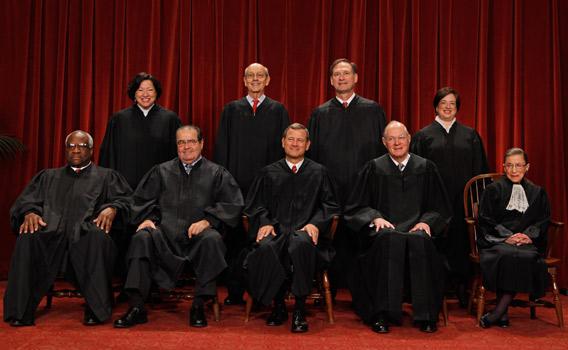This week, challengers to the Affordable Care Act are asking the Supreme Court to say that the Constitution does not permit the government to require Americans to purchase health insurance. Lawyers for the government are asking the court to say the opposite. The court should say neither.
What it should say instead is this: “By requiring that Americans purchase health insurance, two coequal branches of government—Congress and the president—have determined that the Constitution permits such a requirement. Because that determination is reasonable, we need not reach an independent judgment on the question. Our inquiry is therefore at an end.” That is, so long as reasonable people can believe that an act of Congress is constitutional, the Supreme Court should generally let the legislation stand.
You’re thinking two things. First, it is naive to think that Congress or the president actually deliberates about whether laws are constitutional. Second, it is downright lunacy to think that the Supreme Court should defer to the self-serving views of politicians on this question. We are, after all, a country of laws and not of men.
Both objections are misplaced. From the early days of the republic, members of Congress and presidents have vigorously debated major pieces of legislation in constitutional terms. The most significant legislative controversy of George Washington’s administration was over whether Congress had the power to incorporate a national bank. Congress had a spirited debate, and, before signing the bank bill into law, President Washington requested detailed legal opinions from Attorney General Edmund Randolph, Secretary of State Thomas Jefferson, and Treasury Secretary Alexander Hamilton. When Andrew Jackson vetoed the reauthorization of the bank in 1832, he did so explicitly because (contrary to Congress and the Supreme Court) he independently judged it unconstitutional.
Opponents of the Civil Rights Act of 1866, including some who supported its ends, believed that Congress did not have the constitutional authority to pass the Act, and urged rejection on those grounds. A century later, those who opposed the Civil Rights Act of 1964 argued that the law exceeded Congress’ power to regulate interstate commerce and that banning racial discrimination by private restaurants and inns infringed on rights of association. By passing the law, Congress rejected those constitutional arguments, relegating them to the fringe.
To be sure, debate over the Affordable Care Act was hardly a model of reasoned deliberation. (Death panels, anyone?) But the very constitutional question being raised before the Supreme Court—that the government may not force people to buy insurance—was raised and debated in Congress. The lawyers David Rivkin and Lee Casey posed the constitutional question in a Washington Post Op-Ed in the midst of the 2009 congressional debate, and both Nancy Pelosi and John Boehner discussed it.
The bigger question is not whether passage of the bill reflects a constitutional judgment—after all, the president and members of Congress take an oath to support the Constitution—but whether judges owe any deference to that judgment. To let Congress judge the constitutionality of federal laws would seem to allow the foxes to guard the henhouse.
We must not forget, though, that striking down congressional statutes carries its own significant cost—these are the laws our democratically elected representatives have passed. And history confirms that when the court overturns national laws, its track record is spotty at best. The court’s invalidation of the Missouri Compromise in the Dred Scott case may have led to the Civil War. Its striking down of federal laws in the first half of the 20th century prevented Congress from regulating child labor and weakened President Roosevelt’s efforts to pull the nation out of the Great Depression. The court’s recent decision in Citizens United permitting unlimited corporate election spending threatens American democracy itself.
It is no answer to point to cases like Brown v. Board of Education or the many other instances in which the court has correctly overturned acts of state legislatures, local officials, or federal prosecutors. The court has an important role to play in ensuring that state and local actors and unaccountable individuals invested with government authority comply with federal law. That role is especially important where rights of minorities are at stake. But this is not true of the Affordable Care Act. And Congress is different, which is why Oliver Wendell Holmes wrote in 1913: “I do not think the United States would come to an end if we lost our power to declare an Act of Congress void. I do think the Union would be imperiled if we could not make that declaration as to the laws of the several States.”
Holmes was right on both scores. Passing a major, controversial piece of national legislation is a heavy lift. It requires the support of 218 members of the House, 60 senators, and the president. It requires committee hearings and grandstanding, takes up hundreds of hours of cable news time and thousands of inches of newspaper columns, engages activists of all stripes, and requires intense negotiation, the expenditure of political capital, and the imperiling of electoral prospects. It should not also require the blessing of Anthony Kennedy.
